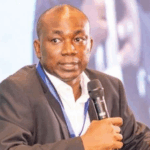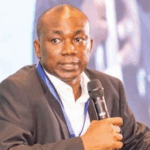
Economist Professor Godfred Bokpin has said Ghana’s economic orientation is not structured to promote exports but to encourage imports.
Speaking on JoyNews’ PM Express on October 15, he warned that without fixing the country’s deep structural issues, policies like the zero-tariff trade deal with China will do little to strengthen Ghana’s economic base.
“If you look at our economic orientation, it is not designed to favour exports,” Prof. Bokpin said, adding, “Everything we are doing here is largely to make us more import-driven.”
He explained that key macroeconomic fundamentals reflect this imbalance.
“You look at low exchange rates. You look at inflation on imported items—it’s lower than inflation on locally produced goods,” he said.
“Look at all those fundamentals. Look at your financial system. Your financial system is not designed to enable export. Your financial system is designed to support imports.”
Prof. Bokpin pointed to the distribution of private sector credit as evidence of the problem.
“Look at the composition of private sector credit, and you will see the portion that goes to agriculture and manufacturing compared to the portion that goes to services, which essentially fund trade.
“The structure of the financial sector itself is to enable import and not production,” he said.
He noted that such an orientation limits Ghana’s ability to benefit from trade agreements or global market opportunities.
“There are real structural issues that we need to fix,” he stressed. “Even with some level of tariff, we could still be competitive if we fixed these issues. But without that, tariff alone doesn’t change the game.”
Prof. Bokpin also highlighted the infrastructure gap that undermines competitiveness.
“If a firm is situated in Accra and has to access raw material from, say, Cape Coast or Takoradi on this road, how competitive can you get?” he asked.
“The distance between Beijing and Shanghai is 1,200 kilometres, and a train does that in less than five hours. The distance between Accra and Kumasi is about 250 kilometres, and it takes people 10 hours. Others don’t even arrive.”
He said the lack of competitiveness has forced some businesses to relocate to neighbouring countries.
“If Ivory Coast is talking the way we are talking, or Rwanda, you’d understand, because they are putting in place the fundamentals. Some businesses in Ghana today prefer to operate from the Ivory Coast rather than set up here.”
Prof. Bokpin further questioned Ghana’s preparedness in trade negotiations, especially with major economies like China.
“Have we sat down to develop a strategy? Does Africa have a strategy to engage the rest of the world?” he asked.
“Having the African Continental Free Trade Area doesn’t mean we are taking advantage of it. It’s like saying that because Africa has more slots in the World Cup, it will win. It depends on how you prepare your players, who are your industrial sector actors and investors.”
He concluded that Ghana’s lack of export competitiveness, high cost of credit, and poor infrastructure are holding back its growth potential.
“We are not laying the economic foundation that allows us to take advantage of these things,” he said.
“Without fixing the fundamentals, we will remain import-dependent, no matter what trade agreements we sign.”
- President Commissions 36.5 Million Dollars Hospital In The Tain District
- You Will Not Go Free For Killing An Hard Working MP – Akufo-Addo To MP’s Killer
- I Will Lead You To Victory – Ato Forson Assures NDC Supporters
Visit Our Social Media for More




